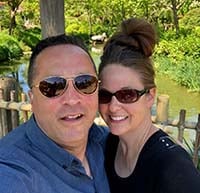I came across two quotes recently that were related but different in their approaches to one another. The first comes from the poet and famous author Ralph Waldo Emerson who said, “Trust thyself, every heart vibrates to that string.” Plain and simple, putting trust in one’s own abilities and perspectives is the common view of the heart.
The second quote comes from Christian author and radio personality Brant Hansen. In reading his book “Unoffendable,” I was acutely aware of a quote that almost came off the page and grabbed my attention. It contradicted what I had read from Emerson.
Brant says, “If dependence on God is our goal, then weakness is an advantage.” Wow! As he sees it, we cannot shy away from weakness because, as he states, it can be the evidence of dependence. The bottom line here is that I am weak in too many areas. That weakness can bring me to dependence if I allow it to.
My flesh is weak, my sinful nature apparent, and my perspective is quite limited. In recognition of my weakness, it can lead me to depend on the Rock of Ages, or I can try harder to achieve results by depending on my own gifts, talents, and wisdom to get me to the finish line.
I think there are only two paths here. We are either self-reliant, dependent on our natural gifts and abilities and without reliance on our creator, or reliant upon Him in His sufficiency. I am reminded of the Philippians passage, “I can do all things through Christ, which strengthens me.” The choice for many remains self-reliance, but for some the ease and joy of dependence upon God is too difficult to ignore.
There is a burden that is a natural consequence of being self-reliant and it is a heavy one. My decisions are often clouded with emotions and past hurts and regrets. My perspective is limited as I am not God the Father. My emotions often unduly influence my decisions. In short, I need a third party who has my best interests at heart and in fact, has stated that I can lean on Him during the good times and the bad.
God has promised to guide my footsteps and guide my life if only I put my trust in Him completely. The deal is great; I get the creator of the universe guiding my life by only putting my full faith and confidence in Him. Is there a deal better than this one?

What then are some practical steps for greater reliance on the Lord?
First, we must confess our sin of self-sufficiency. An admission that we have been operating under our own power is par for the course if we are to move forward. If we are unwilling to come clean on this issue with our heavenly Father, our pride is clearly standing in the way.
Secondly, we need to make it a habit of taking our issues to the Lord. As we do life, we are often tempted to do things our own way and in our own wisdom and power. Moving forward in this manner is the antithesis of what dependence upon God means. We must bring the big things as well as the small to Him. As we walk through painful, mundane, and often common circumstances in our lives, we develop our relationship of dependence on Him.
Lastly, we must recognize Him as the Shepherd of our souls. I say this because He is. I just do not think we acknowledge this as often as we ought. He is leading us beside still waters, and He is in the process of restoring our souls (Psalm 23).
For some, relying on their own wisdom and judgment is the path to enlightenment. However, I have chosen to put my confidence in a God I have never met. He has been recommended by a number of sources as being reliable and has been called omniscient (all-knowing.)
In the end, we must make the decision on our own. The choice seems clear to me: I choose to rely on my Creator to guide my paths. He is well-versed in my struggles and He knows I have such limited perspective and judgment. And He still extends the invitation to “Cast all my burden on him, for he cares for me.”
With that said, will you choose to trust Him in the decisions of your life? Or will you carry the burden of self-reliance and choose your own route?






